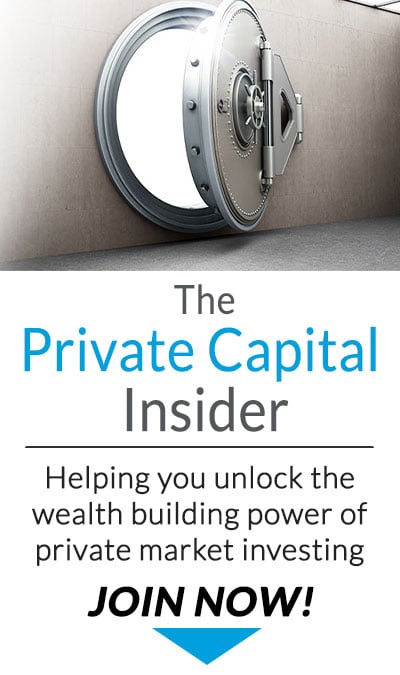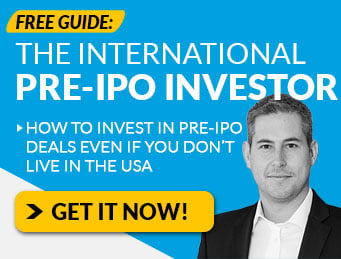Not only have we officially entered Q4 – which is typically the busiest time of year for us here at Equifund…
Today is our 25th issue of the weekday “investor education” edition of Private Capital Insider!
Why should you care?
Because right now, I’m putting together our editorial calendar for Q4 and am looking for feedback from our readers on what they’d like to see more of.
After you’re done reading today’s issue, hit reply and let me know your thoughts.
Let’s get into it!
-Jake Hoffberg
P.S. I started my career as a financial ghostwriter in 2016. Since then, I’ve written (or otherwise sold) several books for financial gurus you’ve heard of.
But my upcoming book – working title, “The Generational Wealth Code: Exposing the Secret Wealth Building Strategies Used by Financial Insiders and Elites to Get Rich in Record Time” – will be the first book I’ll publish that has my name on the cover as the author.
For those who are interested in being part of my “beta” book readers, I’ll be recruiting a small group of people who are interested in reading through draft chapters and providing feedback.
The Generational Wealth Code: Exposing the Secret Wealth Building Strategies Used by Financial Insiders and Elites to Get Rich in Record Time
For those who don’t know my story, I’m Jake Hoffberg, one of the co-founders here at Equifund Corp.
I’d say I’ve probably written more than 250,000 words of copy since I started in 2020…
And probably more than 1.5 million words since I started my career as a professional financial ghostwriter in 2016.
I’ve been lucky enough to work with some of the top brands in financial publishing, and helped grow readership for people like:
- David Stockman, the former Director of the Office of Management and Budget under President Ronald Reagan;
- Jim Rickards, “CIA insider” and former investment banker, famous for structuring the Long Term Capital Management bailout;
- James Altucher, former hedge fund manager, author, speaker, and entrepreneur; and…
- Robert Kiyosaki, author of Rich Dad Poor Dad – the #1 bestselling book on personal finance.
Even though I never studied finance in school (or writing for that matter), working as a financial ghostwriter meant I got to learn first hand from some of the best selling financial authors in history.
Thanks to this experience, I’d like to think I’ve earned an honorary PhD in how money and investing REALLY works.
Or at least I thought I did.
You see, for most of my life, I thought “investing” meant putting money in the public stock market.
When I started ghostwriting for these “gurus,” I thought for sure I would learn some proven formula for extracting tons of money from the stock market.
But instead, I discovered the truth about investing in the public stock market…
You are playing one of the most complex “games” in existence, and it is most definitely rigged in favor of Insiders and Elites.
And even though I thought I was helping “the little guy” gain access to investment strategies that could deliver extraordinary gains…
It never occurred to me that the people who were REALLY getting rich weren’t the retail investors putting money into whatever “lottery ticket” investment opportunity that was being promoted.
And strangely enough, it wasn’t the publishing company selling subscriptions that was getting rich either.
The people who were REALLY getting rich were the bankers who put the deal together in the first place!
Think about it…
If you want to buy shares in the public stock market, who are you buying it from?
By definition, because you are buying shares on the secondary market, this means you’re buying shares from another shareholder (i.e., someone with inventory to sell).

But whenever I studied how “name brand” investors buy stock – like Warren Buffet for example – they don’t go to their E-Trade account and put in an order.
No, no, no. They buy stock directly from the company under terms they negotiate (called the primary market).
This is what separates Insiders from Outsiders.
- Insiders get to negotiate their own terms, and buy at “wholesale” prices.
- Outsiders get whatever the market rate is, and buy at “retail” prices.
And even though I had access to some of the very best investment research and trading strategies in the world, thanks to my career ghostwriting for these financial publishing companies…
It was pretty clear to me that an organized group of Insiders pretty much always beats a disorganized group of Outsiders.
Which begged the question…
“Even if you tell me the ticker symbol of a stock that could potentially generate a significant return…
Am I really on the Inside if I’m buying shares in the public markets? Or am I the sucker at the table?”
The more I learned about how the public stock market works – and the unfair information advantage stock exchanges sell to some of their customers that, in effect, allows them legally front run their other customers…
The less I believed that a regular retail investor – even armed with institutional grade research – had any chance at generating any sustainable, market beating return (outside of pure luck).
Now, that’s not to say investment newsletters aren’t helpful, useful, or interesting.
In fact, I’d go so far to say that learning how to do real research to uncover hidden profit opportunities – and telling a great story about what I found – has become one of my most valuable skills.
In a nutshell, my job was, and still is to a degree, to:
- Learn how these authors saw the world (aka the “worldview”), and how they turned that worldview into an investment thesis that had the potential for outsized returns…
- Think critically about all of that complex thinking, and then assemble the important details into in a narrative that everyday investors could understand (aka “the Big Idea”), and finally…
- Write something about an exciting investment opportunity that could capitalize on said Big Idea.
This is how I learned to do a “top down” analysis, which I still use today.

Since I began my career in 2016, I’ve had the chance to learn – and write about – almost every “hot trend” and speculative frenzy that’s popped up.
But the longer I worked in the industry, the more obvious it became to me that if I really wanted to help my readers improve their finances…
They needed a LOT more help than lottery ticket investment opportunities (or high risk trading strategies) can provide.
In fact, I’ll go so far as to say that any “easy button” income strategy you see – like trading options, penny stocks, and crypto – is probably a thinly veiled scheme to lure unsophisticated investors into a killing field.
And I’m not the only one who thinks so. According to my favorite entrepreneur/investor/philosopher, Naval Ravikant: “There are no get rich quick schemes. That’s just someone else getting rich off you.”

That’s when I started studying how wealthy families ACTUALLY build generational wealth…

What types of assets the wealthy REALLY own…
Source: Visual Capitalist
How the wealthy use debt, depreciation, and deductions to avoid taxes and build wealth…


What I discovered shook me to my core…
Everything I had ever learned about investing was “wrong.”
You see, most people think the people who become a billionaire in a single generation are visionary founders of high-growth technology companies – like Elon Musk, Jeff Bezos, and Mark Zuckerberg.
But if you want to maximize your chance of hitting the Forbes billionaire list, there’s no better way to get rich than to be in the money business!

Even if you consider Jeff Bezos a tech founder, he started his career in finance at the then two-year-old hedge fund, D.E. Shaw.
Same thing with Bernard Arnault, CEO of luxury goods conglomerate LVMH, and the current wealthiest man on Earth.
Arnault spent some time in America during the 80’s and happened to live next door to John Kluge – who, at the time, was the richest man in America, and was in the middle of doing the largest leveraged buyout ever, at that point.
All Bernard did was take this very American “corporate raider” private equity (PE) playbook back to France and used it to build his empire that way.
Long story short, if you want to build extraordinary wealth in a short period of time, there’s lots of evidence to suggest the PE playbook is the way to do it.
In fact, the number of PE multibillionaires rose from three in 2005 to 22 in 2020.
That’s why I started learning everything I could about how BANKERS play the Game of Money.
And when I did, it again made me question everything I’d ever learned about building wealth.
Generally speaking, there are two main reasons people invest:
- Money Now: the investor is looking to increase short-term cash flow to cover living expenses and lifestyle
- Money Later: the investor is looking to increase net worth, which, in reality, is just cash flow at a future date
Bankers (i.e., “Insiders”) want their Money Now. And they are masters of shifting risk onto the borrower to ensure they get paid first.
But the general public (i.e., “Outsiders”) has been conditioned by financial institutions to buy, hold, and otherwise hope for Money Later.
So how do Bankers create Money Now, more commonly called cash flow?
In one word: Arbitrage
To create an arbitrage opportunity, you need to have the following criteria in place:
- An income-producing asset (such as an operating business, real estate, insurance policy, and bonds)
- A lender that is willing to lend against the asset as collateral, in order to obtain leverage (i.e., debt)
- Income that is larger than the loan payments and expenses related to the asset
This, in a nutshell, is the secret to passive income.
And if I wanted to put myself on the fast track to creating passive income…
I knew I needed to get OUT of the public markets and IN to the private markets.
The only problem: If you’re a regular investor like I am, there’s pretty much no way to get access to the types of private deals these Insiders and Elites do.
And even if you DID have access to the same “Off Wall Street” investments billionaires do…
Because you are almost certainly a minority, non-controlling investor, who is investing in a relatively insignificant checksize…
You are going to have the same problems all retail investors have in private markets.
You have no ability to structure your own deals, perform any significant due diligence, or be anything other than “Dumb Money” in the deal.
But let’s say you do happen to be one of the lucky lottery ticket winners and hit a massive 100x return.
That doesn’t mean you have the financial literacy – or infrastructure – to turn a sudden windfall into generational wealth.
Instead, you would be forced to rely on an endless army of Bankers, financial advisors, and brokers, who get paid, regardless of whether you win or lose.
So I asked myself the question you might be asking yourself right now…
If Insiders are masters at shifting risk to Outsiders, how do I flip the script, and get on the better side of the deal?
I was going to have to build my own infrastructure that was designed to help ME build wealth… not my advisors.
In a nutshell, this is how a Family Office helps build and maintain generational wealth – they act as a Family Bank (among other things).
Source: Anja Bauer, Wikimedia Commons
While technically, you don’t have a bank charter, and therefore aren’t a “real” bank…
The Family Bank is a family-funded entity that provides banking services to family members and family businesses.
After nearly eight years of researching and writing about business, finance, and wealth creation…
I’ve compiled everything I’ve learned into an organized wealth-building framework that looks like this:
The Generational Wealth Code: Cash Flow Chart
Private Capital Insider has always been the newsletter I wish someone wrote for me when I was getting started.
And thanks to a cold LinkedIn message in late 2019 from the founder of Equifund, Jordan Gillissie…

I can do more than just write about private market investing.
Thanks to the incredible regulatory innovation that is the JOBS Act, I’ve been able to pursue my own selfish goal of wanting to get into private market investing by helping other people come along for the ride.
And I’ve gotta say, being co-founder at Equifund has been one of the most rewarding experiences in my career.








